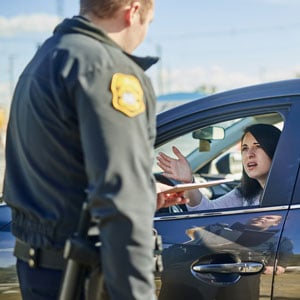
In this article, you can discover…
- What to do when pulled over on suspicion of DUI.
- If you have the legal right to refuse a field sobriety test in Maryland.
- What to expect if arrested by an officer.
What Should You Do When You Are Pulled Over For A Suspected DUI?
When you see the flashing lights of a police car in your rearview mirror, there are a few important steps to follow:
- Pull over immediately.
- Be respectful and provide your license and registration when asked.
- If the officer requests that you step out of the vehicle, it’s important to comply.
Beyond providing identification and stepping out of the car when instructed, you are not required to answer further questions. For example, questions like “Have you had anything to drink this evening?”, “Where are you coming from?” or “Where are you going?” do not need to be answered.
It’s best to calmly inform the officer that you will not be answering additional questions without your attorney present. This can help protect you from unintentionally incriminating yourself or providing statements that could later be used against you.
What Are Field Sobriety Tests? Can You Refuse To Take The FSTs In Maryland?
Field sobriety tests (FSTs) are physical exercises that officers may request you to perform to assess your motor skills for signs of impairment. One common example is the horizontal-gaze nystagmus test, where an officer asks you to follow the movement of a finger or pen with your eyes, checking for involuntary eye movements that could indicate intoxication. Other tests include standing on one leg or walking in a straight line and then turning around—these are designed to evaluate your balance and coordination.
Do you have to take these tests if an officer asks? No, you are not required to perform field sobriety tests in Maryland, and there is no legal penalty for refusing. These tests can be challenging for anyone, even when sober, to complete perfectly.
If asked, you can simply say, “I politely decline to perform any field sobriety tests.” By this point, the officer may have already decided whether to arrest you, but it’s crucial to protect your rights at every stage of the interaction.
What Happens If An Officer Decides To Arrest You On A Roadway In Baltimore?
If the officers decide to arrest you, stay calm, and be polite. Remember: you are not legally obligated to explain yourself to an arresting officer. Instead, simply exercise your right to remain silent, and respectfully decline to answer any questions without your attorney present, even if the questions seem casual or easy to answer.
After the arrest, contact a qualified DUI attorney as soon as possible. Your lawyer will help you understand the details of your arrest, advise you on how to handle further interactions with the authorities, and begin gathering evidence to build your defense.
Still Have Questions? Ready To Get Started?
For more information on DUI Traffic Stops In Baltimore, an initial consultation is your next best step. Get the information and legal answers you are seeking by calling (410) 390-3101 today.
